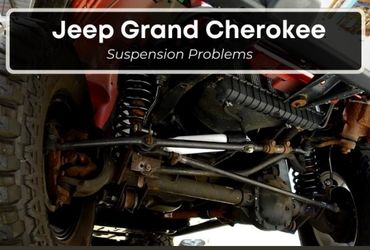
The 2023 Jeep Grand Cherokee is a versatile and stylish SUV that is famous for its impressive capabilities. One of its standout features is the Quadra-Lift air-ride suspension, which has been a part of the Grand Cherokee line-up since 2010. It can ground clearance, wheel movement, and height, providing unparalleled adaptability while driving. At first, this technology was only available for certain models of the Grand Cherokee WK, but now it is more widely available. However Jeep Grand Cherokee Air Suspension Problems are commonly reported by users.
The air suspension in a Jeep Grand Cherokee is designed to offer a comfortable and smooth ride for the driver and passengers. However, over time, some users may encounter problems with the air suspension. To address these issues, it is important to identify the problem and understand potential solutions. This article will provide information on common problems associated with air suspension, as well as methods for troubleshooting and resolving these issues.
What is Air Suspension?
A regular suspension system works similarly to an air suspension system. For a stable, comfortable driving experience, both types of suspension connect a vehicle’s body to its wheels/brakes and absorb road bumps/vibrations.
The air suspension, however, uses rubber bags filled with air instead of coil springs made of steel. There are also air compressors (for supplying air), height sensors and pressure sensors, and air reservoirs (for storing air).
The control module monitors the air pressure of each air spring. A low pressure will increase the height of the air spring by blowing air into it.
A high pressure, however, releases more air from the air spring. As The suspension system offers many advantages over spring-based suspension systems, including a comfortable ride (even on rough surfaces), improved handling, and long-lasting performance.
What does the Air Suspension Do?
There are several important functions that your Jeep’s suspension performs while you’re driving.
Firstly, your suspension connects the wheels to your vehicle’s body. As opposed to being rigidly attached to the vehicle, your suspension system allows the wheels to move freely. It is the wheels, not the body, that adjust when you hit a bump, for example.
In addition to increasing stability and comfort, your suspension also improves handling. In addition to absorbing vibrations, suspension keeps your vehicle stable while turning, resulting in a more comfortable drive.
Adding air suspension to your Jeep Grand Cherokee is possible with Quadra-Lift. The suspension can be raised or lowered automatically, without having to stop the vehicle. Users of Jeeps will benefit from this in terms of utility. As long as the system does not fail and you can get it repaired before it leaves you in park. The lack of Quadra-Lift suspension on the new Grand Cherokee L models might have something to do with this.
There are, however, some early warning signs of air suspension failure with your Jeep Grand Cherokee. It is important to keep an eye out for these signs in order to avoid driving on a faulty suspension, which can cost you time and money.
How Long Will The Air Suspension Last In My Jeep Grand Cherokee?
The Jeep Grand Cherokee is famous for its longevity, with many models lasting well over 250,000 miles. The air suspension system in this vehicle is reliable, with a lifespan of approximately 100,000 miles or more. But, at around 120,000 miles, it is common for Grand Cherokee owners who have the air suspension option to need to replace all four air springs.
But like any vehicle, it can experience problems. One issue that some Jeep Grand Cherokee owners may encounter is a problem with the air suspension system. If you are experiencing this issue.
What are the Possible Signs Air Suspension Problems?
Here are some possible signs of Jeep Grand Cherokee air suspension problems:
- Uneven tire wear: If your Jeep’s suspension is poor, this may result in your tires wearing more on one side than the other. This may result in ineffective handling and decreased fuel efficiency.
- Poor handling: If your Jeep’s suspension is malfunctioning, it may affect how the car handles. When driving, you might feel your Jeep is unstable or “bouncy,” or that it is challenging to steer or control.
- Increased body roll: When a vehicle is turning, it has a tendency to lean or tilt to one side. Increased body roll, which can make the Jeep feel less stable and more prone to toppling over, can be a sign that your Jeep’s suspension isn’t working well.
- Poor suspension: When driving over bumps or other rough surfaces, your Jeep may make knocking or clunking noises. The suspension system’s worn-out shock absorbers or damaged ball joints may be the root of this problem.
- Fluid leaking: If you notice fluid dripping from the suspension system of your Jeep, there might be an issue with the system. There are many different problems that can lead to fluid leaks, such as worn or damaged seals or broken hydraulic parts. Read more about Why Is My Jeep Wrangler Leaking Oil? Reasons Explained!
What Are The Jeep Grand Cherokee Air Suspension Problems?
The system of a traditional metal-spring suspension is different from the air suspension system. Four air springs, a compressor, some pressure-holding lines, and electronic control blocks will be used for operating all these components.
You won’t believe it, but all units of the air suspension system in your Grand Cherokee will fail. Not the springs could begin to leak air or something. It’s about all parts of the system.
The most typical issues are listed below:
- leaking air – the air spring may experience air leaks as a result of some of the rubber components drying out and becoming unable to maintain the required pressure;
- leaky lines: the compressor will begin running continuously because of the pressure these lines are releasing;
- compressor issues – it could stop working, causing your vehicle to after all drop to the lowest clearance possible;
- impossible stiffness – the vehicle will be stiff and impossible to drive as a result of suspension issues;
If the electronic control units begin malfunctioning as well, the tension will start to fluctuate in numerous ways.
The fact that each component of the suspension depends on the others is the most unpleasant aspect. The compressor will have to work harder to maintain the required pressure. After all, it will impact all other air springs and worsen wear and tear on the compressor.
Is it Possible to Drive with Jeep Grand Cherokee Air Suspension Problems?
It is not recommended to drive a vehicle with a bad suspension. A faulty suspension system can affect the handling and stability of the vehicle, which can be dangerous when driving. It can also cause additional wear and damage to other components of the vehicle, such as the tires, brakes, and steering system. If you notice any of the signs that your Jeep’s suspension is bad, it is important to have it repaired as soon as possible to avoid further damage.
Solutions
- Leaking air suspension system: If the air suspension system is leaking, it will not be able to hold the proper amount of air pressure and will not function well. This can be caused by a faulty air spring, airline, or compressor. To fix this problem, the faulty part will need to be repaired or replaced.
- Compressor malfunction: The compressor is in charge of supplying the air suspension system with air. The air suspension won’t work if the compressor is malfunctioning. An unreliable compressor or a wiring issue may be to blame for this. The compressor will need to be fixed or replaced to solve this issue.
- Misaligned height sensor: The vehicle’s height is measured by the height sensor, which then modifies the air suspension as necessary. If the height sensor is broken, the air suspension won’t function well. The malfunctioning height sensor can be changed to resolve this.
Troubleshooting Jeep Grand Cherokee Air Suspension
Troubleshooting your Grand Cherokee’s air suspension is quite important, as you may know. Professionals typically perform this task, but if you want to do it yourself, you can follow two methods.
The first method involves scanning the fault code on the dashboard with an OBDII scanner and identifying the root cause. Otherwise, check the air springs and all the lines supplying air visually. Any leaks should be detected by inspecting the compressor and other components.
To do this, spray a three-percent solution of wet vacuum soap onto each connector and every pipe joint. The origin of your problem might be found by identifying a bubble where a leak is also present.
It would then be necessary to either replace the tube or repair the punctured part. Below the hood is a fuse that provides 40 amps of power. The compressor is likely to have seized or stopped working when this fuse blows.
Tips for Increasing the Life of the Suspension on Your Jeep Grand Cherokee
- Check and maintain air pressure: It’s essential to maintain the correct air pressure in your Jeep’s air suspension system to ensure proper operation and extend the system’s lifespan.
- Air springs: a crucial component of an air suspension system, can degrade over time and ought to be replaced as necessary. Make sure to replace them as necessary to maintain the suspension system’s correct operation.
- Avoid overloading: If your Jeep has an air suspension system, overloading it can hasten the air springs’ wear-out. Make sure to only put the weight that your Jeep can carry on it.
- Quickly fix leaks: If you notice any leaks in your air suspension system, you must immediately fix them. As the system loses pressure, your Jeep’s handling and stability may suffer.
How Do You Fix the Air Suspension?
Unfortunately, we won’t provide you with any money-saving tips so that you can fix the air suspension. The air springs must change if they are malfunctioning. Some businesses will offer to fix and remake the air springs, but these produce poor outcomes.
Remanufactured air springs may function well for an extra 10,000 cycles before developing problems. The air spring quickly loses all its components. After you fix it, this will result in issues with your air suspension.
Cost of fixing the air suspension problem:
There are two main ways that we recommend, and you can choose one of them depending on your budget:
- Changing every component in your air suspension You will at the very least need to look at the compressor’s condition and replace the air springs. The most expensive solution to the issue is this one. But, at least it is reliable and will allow you to drive safely for another 100,000 miles. It will cost more than $3000.
- Establishing a conventional suspension system If you don’t have $3K to spend on new air springs, this is also a good alternative. You can replace the air suspension with a conventional metal-spring suspension kit. It’s not cheap; it will cost you about $1200 for parts and another $400 to $500 for labor. With air suspension, you’ll never experience any issues.
How to Reset Jeep Grand Cherokee Air Suspension?
It’s wise to reset the air suspension of your Jeep Grand Cherokee when it undergoes a major repair. As well, in some cases, the suspension repair warning light may illuminate regardless of whether everything is in good condition. In this case, it is also necessary to reset the air suspension. The following steps will guide you:
Start by ensuring the vehicle is on a flat surface, the engine is shut off, and the air suspension compressor is disconnected. A vehicle’s engine compartment is usually where this is located.
In addition, you should disconnect the fuses for the F50 Air Suspension Mod and F87 Air TT/Susp.
To restart the air suspension system, remove the negative battery terminal. Fuse all the fuses and wait a minimum of five minutes before reconnecting the negative battery terminal.
Start the engine and wait two minutes for the air suspension system to reset. Ensure that the air suspension is working properly. A diagnostic tool can be used or the dashboard controls can be used in the cockpit to do this.
What is the Cost Of Fixing The Air Suspension Problem?
There are two main ways that we recommend, and you can choose one of them depending on your budget:
Changing every component in your air suspension You will at the very least need to look at the compressor’s condition and replace the air springs. The most expensive solution to the issue is this one. But, at least it is reliable and will allow you to drive safely for another 100,000 miles. It will cost more than $3000.
Establishing a conventional suspension system If you don’t have $3K to spend on new air springs, this is also a good alternative. You can replace the air suspension with a conventional metal-spring suspension kit. It’s not cheap; it will cost you about $1200 for parts and another $400 to $500 for labor. With air suspension, you’ll never experience any issues.
Why Should you Choose a Jeep with Air Suspension?
Well, if you can pay a little more for a new car than just for a base version, then you should consider the option of air suspension. We can’t say that it’s absolutely necessary, but we should say that the suspension will improve your experience with this vehicle. It’s not only about the possibility to choose the type of driving.
The air suspension also gives you other advantages. And here are just some of them:
- you can prepare for a certain type of terrain which is important for a Jeep;
- you can prepare your vehicle for a certain load or for towing a trailer;
- your tires will live longer with this option;
- you can regulate the ride height or clearance easily;
- you can choose the stiffness of your suspension which is cool;
- your driving will be absolutely comfortable, in most cases;
- you will not need to invest in minor repairs every 10-20 thousand miles;
- even a broken air suspension unit will still hold your SUV, but it will be lower than other units.
A lot of advantages are found in air suspension. It doesn’t mean that the conventional suspension type is no longer good. It only means that air suspension is a kind of technology for all future cars. At least, this is what a lot of car sellers tell us when they want to sell us a vehicle with a lot of additional options included.
Conclusion
To ensure the safety and functionality of the vehicle, any problems with the air suspension system must be fixed as soon as possible. It is advised that you consult a mechanic if you are unable to resolve the issue on your own.
FAQ
What are common problems with the Jeep Grand Cherokee?
Among the most frequently reported problems with the Jeep Grand Cherokee are transmission problems, electrical issues, and suspension problems.
The Jeep Grand Cherokee’s dependability?
The reliability record of the Jeep Grand Cherokee is erratic. Some models and years have received numerous reports of problems, whereas others have experienced fewer issues.
Are there any Jeep Grand Cherokee recalls?
Yes, there have been a number of Jeep Grand Cherokee recalls over the years. Transmission, airbag, and electrical system problems have been a few of these.
Can you tow a boat behind a Jeep Grand Cherokee?
According to the trim level and engine, the Jeep Grand Cherokee can tow up to 7,200 pounds.
What about the Jeep Grand Cherokee in the snow?
The Jeep Grand Cherokee has four-wheel drive, which can help increase traction in icy and snowy weather. But because it’s not designed for snow, it might still have trouble in really deep snow.
RELATED:
Most Common Jeep 4.7 Ho Engine Problems & Solution: Explained!







Leave a Reply